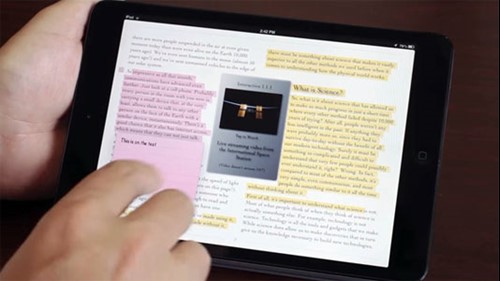Why tablet-based learning?
 Students can watch embedded streaming video alongside notes and highlights in an iBook.
Students can watch embedded streaming video alongside notes and highlights in an iBook.
Compared to printed course materials, tablet-based learning offers many benefits.
With tablets, students can access textbooks for reduced or no cost. Lynn’s tablets help save students money through LUDP’s publications, open educational resources (OERs) and library-licensed e-books.
Tablets also help students reduce costs by making PCs unnecessary.
Aside from expense, tablet-based learning can improve the educational experience in a number of ways. For instance:
- iPads are more portable than stacks of books, making it easy for students to study anywhere, anytime.
- Digital books can include interactive features.
- Digital media and features support different learning styles.
- Digital materials can be easily updated to reflect new information and innovations.
- Students can use their iPads to work on class projects in a variety of media and using many different programs.
LUDP’s iBooks benefit students and faculty alike. Because they’re customized for the course curriculum, they integrate perfectly into the classroom.
(With other types of textbooks, only portions are used. The Florida Virtual Campus survey mentioned above found that students purchased an average of 2.6 textbooks that were never used in class.)
Read more:
Images courtesy of Lynn University.


